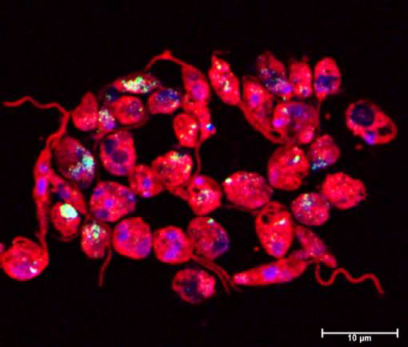D3: Characterisation of apoptotic parasites to identify new target molecules for the treatment of Leishmaniasis
Prof. Dr. Ger van Zandbergen
Abteilung Immunologie
Paul-Ehrlich-Institut
Paul-Ehrlich-Str. 51-59
63225 Langen
Tel.: +49 (0)6103-77 2005
E-Mail: Ger.Zandbergen(at)pei(dot)de
Project description:
Leishmaniasis is a neglected tropical disease caused by the parasite Leishmania spp, which is endemic in almost 100 countries. We could demonstrate that apoptotic Leishmania major (L. major) promastigotes are both responsible for the infectivity and the survival of parasites in host cells. Apoptotic parasites induce an anti-inflammatory response in human macrophages that does not lead to an effective T-cell response against Leishmania. Even if L. major parasites show all typical characteristics of apoptosis, typical eukaryotic apoptosis regulating proteins are not present in Leishmania.

Staining of fragmented DNA (TUNEL staining) in L. major Cas9/T7 in which apoptosis was induced by Miltefosin (TUNEL: green; DAPI: blue; anti-Lm-serum: red. © Ger van Zandbergen)
Scientific goal:
For a novel vaccination approach and to kill parasites we aim to identify apoptosis regulating proteins in Leishmania as potential drug targets as well as attenuated Leishmania strains without anti-inflammatory properties.
DRUID Collaboration partners:
B1 Kolb, B3 Rahlfs/Kolb, E3 Rahlfs/Przyborski
References D3: [1] Arens et al. (2018) Front Immunol 31(9):1772. [2] Crauwels et al. (2019) Front Immunol 22(10):2697. Further publications within DRUID: [3] Turoňová et al. (2020) Science 370(6513):203-208.

